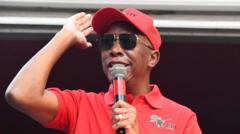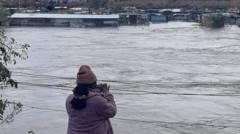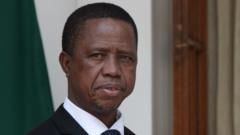Amid rising tensions over fiscal policies, experts suggest the state of the coalition government remains uncertain as the DA weighs its options moving forward.
**Is the Coalition Government in South Africa on the Verge of Collapse?**

**Is the Coalition Government in South Africa on the Verge of Collapse?**
The fragile alliance between the ANC and DA faces severe tests after a contentious budget vote.
South Africa's coalition government is facing a critical juncture following a divisive vote on the national budget, which has revealed sharp rifts between its leading parties, the African National Congress (ANC) and the Democratic Alliance (DA). The DA, identifying itself as a center-right party, voted against the fiscal framework, opposing an increase in VAT and calling for across-the-board cuts in government spending. In contrast, the ANC, which claims a center-left stance, firmly rejected the DA’s demands for austerity measures.
In a display of political prowess, the ANC garnered support from several smaller parties, both governmental and non-governmental, allowing them to secure the fiscal framework's passage through Parliament with a vote tally of 194 to 182. In response to the outcome, the DA has initiated legal action, claiming the vote was "procedurally flawed," while party leadership continues discussions about their ongoing commitment to the so-called government of national unity (GNU).
Professor William Gumede from Wits University remarked on the DA's conundrum, indicating that the party is at a crossroads, weighing the implications of its potential exit against the pending court case outcomes. Formed less than a year ago after the ANC lost its longstanding majority in the wake of Nelson Mandela's legacy, the coalition’s inception followed substantial pressure from the business community, which viewed a partnership as the path to economic stability.
The DA’s position became increasingly tenuous as spokesperson Willie Aucamp criticized the ANC for a "serious infraction," signaling the need for a re-evaluation of coalition dynamics. DA federal chair Helen Zille emphasized the importance of shared power within any collaborative government setup.
The ANC, on the other hand, labeled the DA's actions as a "complete betrayal," with their parliamentary chief whip stating that the integrity of the GNU remains intact due to the support of other coalition members. President Cyril Ramaphosa's office echoed this sentiment, claiming that participation in the government cannot coexist with opposing policies.
Interestingly, the DA found itself unexpectedly allied with South Africa’s two most prominent opposition parties, the uMkhonto weSizwe (MK) and the Economic Freedom Fighters (EFF), both vocal advocates for economic nationalization, further complicating the DA's political stance as it navigates its fiscal opposition. As DA leader John Steenhuisen expressed, the ANC's detachment from the everyday realities faced by citizens significantly undermines its credibility.
Discontent regarding a proposed VAT increase, identified as necessary funding for health and educational services, has ignited heated debate. This discord was compounded when the Inkatha Freedom Party (IFP) shifted its allegiance in the vote, indicating a disintegration of former coalitions, while ActionSA, a breakaway faction from the DA, found common ground with the ANC for an alternative revenue plan.
Observers note that as the DA seeks to position itself as a champion for the economically disadvantaged, it must also grapple with the deteriorating public services under ANC governance, complicating both parties' attempts to communicate effective governance strategies.
With the already high unemployment rate exceeding 30%, the ongoing fiscal disputes highlight the need for a united front among leading parties to avert a deeper economic crisis, especially in light of significant tariff impositions from international actors such as the United States. These tariffs underline the pressing need for cooperation or risk plunging the country further into turmoil.





















